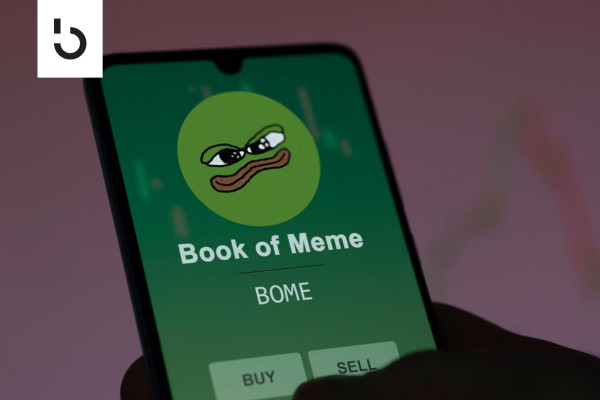Key Takeaways:
- Memecoins, or crypto tokens based on internet memes, have recently experienced a surge in popularity.
- Solana, a high-speed, low-transaction-fee blockchain, is at the forefront of this popularity surge, as it is home to some of the biggest memecoins
- Memecoins are both good and bad for the Solana blockchain. They’re volatile and highly speculative and often attract scammers. However, they also drive user adoption and community engagement to the blockchain.
For good or for bad, we’ve all heard about memecoins. From Elon Musk tweeting about Dogecoin to the latest version of a Pepe-inspired coin, it seems like there isn’t a meme on the Internet that someone won’t try to spin into a blockchain project.
This trend is a double-edged sword, however. While it signals a relatively strong interest in blockchain technology (and, potentially, an influx of new users), it also attracts users with little interest in the overall health of the underlying blockchain technology.
In this article, we’re digging into memecoins on the Solana blockchain. Do these projects ultimately help or hurt Solana? How are they proliferating on Solana? And do they ultimately make SOL a good or a bad investment?
Top Memecoins on Solana
Memecoins are a cryptocurrency inspired by popular internet memes, viral online trends, or pop culture references. While enthusiastic online communities often support these coins, they are highly speculative and volatile, making them a high-risk investment. Their success usually depends on celebrity endorsements and online buzz rather than value or utility, making predicting price and other metrics difficult.
Solana has emerged as the preferred platform for memecoin development due to its speed and scalability, low transaction costs, developer-friendly tools, and a vibrant ecosystem. Some examples of popular memecoins on Solana include:
- Dogwifhat (WIF): Developed on the Solana network, Dogwifhat is based on the meme of a Shiba Inu with a distinctive pink cap. While the coin launched in November 2023, its idea was born in 2019, when a Twitter user named Issa displayed a picture of the Shiba on their Twitter profile. Despite its minimal utility, dogwifhat has experienced exceptional growth since its launch. With a market cap of $2.9 billion, dogwifhat has firmly established itself as a leading memecoin on the Solana blockchain.
- Bonk (BONK): Another dog-themed memecoin on the Solana blockchain, Bonk was airdropped into the Solana ecosystem on Christmas Day of 2022 as a gift to its users. The Bonk team initiated the drop to take control away from big players and bad actors and give the network back to the users. BONK helped bring liquidity to Solana and has even developed its own blockchain-based tools and NFT collections.
-

While several memecoins have seen success on Solana, this doesn’t necessarily mean that memecoins are a net positive for the blockchain.
Memecoins on Solana: Why They’re Bad
- Memecoins are extremely volatile and highly speculative, as their succe ss is often driven by social media trends and hype rather than fundamental value. The uncertainty can increase volatility on the Solana network, making investors wary and more likely to utilize another blockchain with less volatility.
- Additionally, amid the latest memecoin frenzy, congestion issues have plagued the network due to high transaction volumes. In April 2024, Solana suffered network congestion issues, leading to dogwifhat dropping by double digits over a few days and the broader memecoin category on Solana dropping by 14.6%. The congestion also led several crypto projects to delay their token launches on the network.
- Memecoins can increase security risks. In April 2024, a Solana-based memecoin hit $328 trillion in market cap for all the wrong reasons. The memecoin, Bonk Killer (BONKKILLER), was launched as part of a honeypot scam (a type of crypto scam where a developer lures investors with the false promise of substantial returns).
- Investors who purchased BONKKILLER quickly realized they couldn’t move any of their coins after the developer activated a “freeze authority,” which allowed the creator to prevent tokens from being transferred.
- Presale scams have also become more common on the Solana network following the rapid gains of memecoins. To conduct a presale, a token issuer invites users to deposit tokens into a smart contract address, on the promise that they will receive newly-issued tokens when the presale ends. The ease at which these presales can be conducted, coupled with investors’ fear of missing out, has led to many scams, with the nonprofit Blockaid stating that 50% of presales on the Solana network are scams.
- Lastly (and most importantly), memecoins create a huge reputation risk for Solana, as they’re often viewed as a “joke” and not a serious investment tool (for valid reasons). The fact that Solana is the leading network for memecoins may affect the blockchain’s reputation and lead to investors and developers seeking out other blockchains.
Memecoins on Solana: Why They’re Good
While memecoins bring a lot of risk to the Solana network, they also do bring several benefits.
- For one, memecoins help drive user adoption and network activity, allowing Solana to showcase its unique capabilities to handle high transaction volumes.
- Memecoins also encourage diversity in project types and innovation within the ecosystem. A diversified portfolio is key for investors, and Solana offers a one-stop shop for creating a diverse crypto portfolio.
- Memecoins help attract different types of investors and users to the Solana network. As mentioned, memecoins typically gain traction due to social media hype, celebrity endorsements, and viral trends. The online buzz around memecoins can help bring in investors who previously had little interest in crypto, expanding Solana’s user base.
And, even though memecoins have brought some security threats and network congestion to Solana, these issues have led Solana to make more concerted efforts to develop scaling solutions and security enhancements that mitigate the impact of high-volume, less serious transactions.
Analyzing the Numbers
Memecoins also have a large economic impact on Solana. For one, they help contribute to the blockchain’s transaction fee revenue. In March 2024, daily active users on Solana reached record levels, largely thanks to memecoin activity.
Also in March 2024, the network’s market cap reached an all-time high.
Memecoins also impact the price of Solana’s native token, SOL. In March 2024, the token reached $196, its highest price point since December 2021. While it has since dipped to $145 as of May 2024, there’s no doubt that the memecoin frenzy helped drive the price up.
Investor Takeaway
Due to their extreme volatility, highly speculative nature, and susceptibility to scams, memecoins bring a lot of risk to the Solana network. They may lead more seasoned investors to hold their tokens anywhere but SOL.
However, memecoins also help drive user adoption, bring in a new demographic of investors, and encourage network innovation and community engagement. If you believe the pros outweigh the cons, then SOL could be a good long-term investment.
Our view: while memecoins certainly bring short-term benefits to Solana, long-term they could be a net negative for SOL. Because memecoins have no utility and aren’t taken seriously as investments, they’re attracting the wrong kind of user, and the wrong kind of project.
On the other hand, investors who come to Solana for memecoins may choose to stick around thanks to the blockchain’s remarkable speed and scalability. Time will tell.
To get our crypto investing tips delivered straight to your inbox, subscribe to our Bitcoin Market Journal newsletter.
Read the full article here

